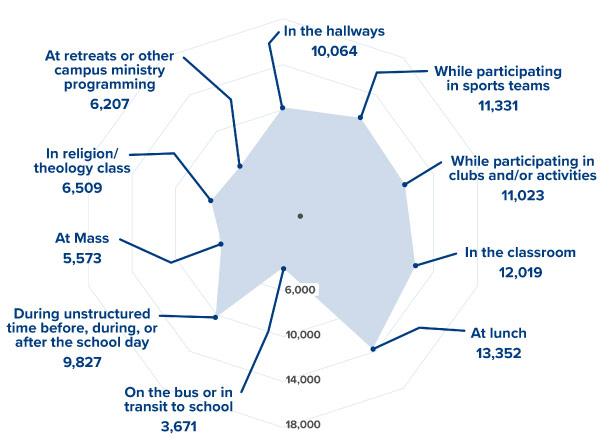
Building Belonging at School: Religion-Focused Environments
In 2023, Springtide embarked on new research with students from Catholic schools from across the country. The findings revealed some specific insights around creating a sense of belonging for students. In this post, we share some insights inspired by this research and other Springtide data on building belonging in an environment where religion is the focus.
In our Catholic school survey, we asked students where they feel a sense of belonging at school. Students could check as many places as were applicable. In the graph below, areas where more students report feeling belonging are farther from the center, and areas that rank lower have a data point closer to the center. Notice that while the lowest number of students feel a sense of belonging on the bus or in transit to school, the other places with the lowest response rates are those that are religious in nature.

Through surveys and interviews, Springtide has gathered insights into young people’s sense of connection and belonging in religious and spiritual spaces:
Religion can feel pressure-filled. In interviews, some young people have said that religion can feel toxic when it is presented primarily as pressure to live up to demanding expectations rather than as a vehicle to help them navigate their current difficulties—especially if those expectations aren’t tied to their lived experience.
Religion can feel forced. Data from The State of Religion & Young People 2022: Mental Health—What Faith Leaders Need to Know show a correlation between young people choosing to participate in a religious or spiritual community and continuing to participate. When young people feel forced, they might be present in body but not necessarily in mind or spirit. Yet when young people choose to participate, they are more inclined to engage deeply.
Religion can feel exclusive. In interviews, young people have said how difficult it can be to belong to groups or to participate in activities where they feel they can’t be their full selves, especially for those from minoritized groups. Young people feel truly seen and understood when the trusted adults in their lives acknowledge who they are and value their presence.

Participation is not belonging. Our research shows that just being present in a space or group doesn’t automatically make young people feel like they belong. They need relationships with peers and adults and need to feel like their presence matters. Even if Mass or other religious services are mandatory, what are the ways young people can express autonomy? How can they contribute to the experience or connect with others more deeply?



